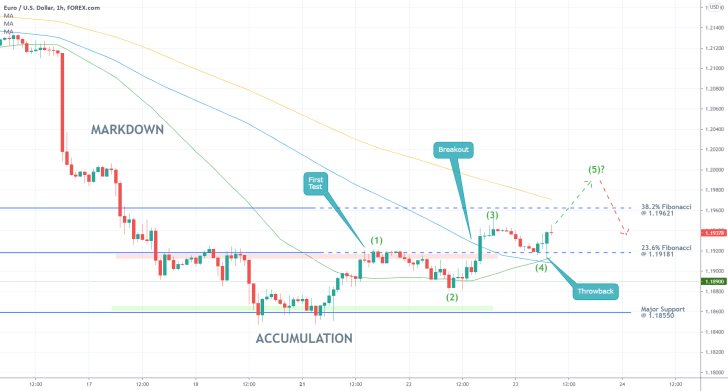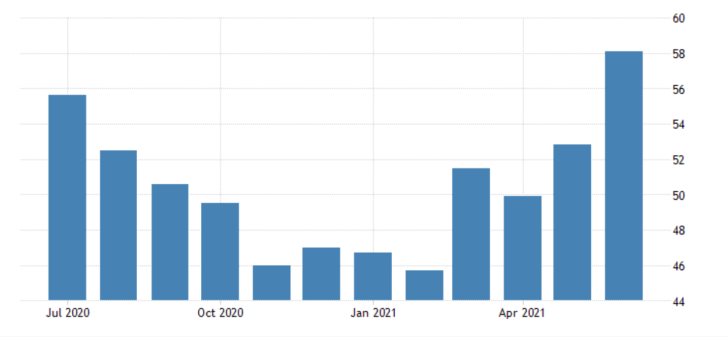
Bullish pressure on the EURUSD pair keeps mounting despite some minor tribulations in the short term. The price rises owing to persistently strong global demand. You can read more about the impact of that from our comprehensive crude oil analysis.
Earlier today, the Markit institute published Germany's latest industry numbers, which surpassed the initial market forecasts. The robust services PMI data strengthened the euro in the short term.

The EURUSD pair was thus able to break out above the upper boundary of the Accumulation range. We let you know about the emergence of the latter on our market update on inflation from yesterday.
Such a breakout was anticipated under the Wyckoff Cycle method as bullish pressure rises. The EURUSD pair thus appears to be establishing a new Markup, at least for the time being.
This directional price action takes the form of a 1-5 impulse wave pattern, as postulated by the Elliott Wave Theory. Notice that the breakout above the 23.6 per cent Fibonacci retracement level was part of the second impulse leg (2-3).
Not only that, but the breakout also drove the price above the 100-day MA (in blue). The following throwback to 1.19181 from above is also congruent with the expectations of the Wyckoff method. The throwback itself served as the second retracement leg (3-4), which consolidated above the 100-day MA and the 50-day MA (in green).
As the underlying bullish pressure now looks ready to continue rising, the EURUSD pair would likely attempt to complete the final impulse leg (4-5). It would most probably try to penetrate above the 38.2 per cent Fibonacci retracement. Bulls also have to watch the 150-day MA (in orange), which serves as a floating resistance.
Better-Than-Expected Services PMI Numbers in June
Germany's services PMI jumped by 58.1 index points in June from the 52.8 points that were recorded a month prior. The consensus forecasts were expecting the index to rise to 55.8 points.

Industrial activity in the biggest economy in the Eurozone rebounded significantly in June, following a massive plunge in sentiment over the previous month. Germany's robust services PMI performance is inlined with ECB's projections for a sustained recovery in the longer term.
Trendsharks Premium
Gold is undergoing a correction, as investors take profits to offset losses from falling stock prices, impacting their margins. However, we anticipate a renewed wave of [...]
The Swiss stock market index is mirroring its global counterparts, such as Germany 40 and US100, experiencing a sharp decline following the announcement of new [...]
We’re analyzing the weekly chart to grasp the broader market trend. Over the past three years, the US30 index has surged by 17,000 points, often resembling a nearly straight [...]
Over the past week, the DAX has experienced a sharp decline, plunging by an astonishing 3,400 points. This downward movement is not isolated, as its international counterparts, such as the UK100 and US100, are also facing significant [...]
EURUSD recently formed a double top at 1.0930, signaling a potential trend reversal, and has since begun a correction. After a 600-pip rally since early March, a pullback at this stage is both expected and healthy. Given these conditions, we are placing a [...]
Since early March, EURJPY has surged nearly 1,000 pips, providing us with several excellent trading opportunities. However, as the rally matures, many early buyers are beginning to take profits, leading to a noticeable slowdown in the uptrend. On Friday, the pair formed a [...]
The AUDJPY currency pair continues to be dominated by bullish momentum, as multiple golden cross patterns reaffirm the strength of the ongoing uptrend. Despite this, we are witnessing a much-needed [...]
The EURAUD currency pair appears to be undergoing a trend reversal, signaling a potential shift in market direction. A notable technical development is the formation of a Death Cross on the chart, a widely recognized bearish indicator that typically suggests a [...]
After securing an impressive 200-pip profit last week, the EURJPY currency pair is now undergoing a southward correction, retracing some of its recent gains. Despite this temporary pullback, the Golden Cross remains intact, reinforcing our view that the overall trend continues to be [...]
The appearance of a Golden Cross in Silver strengthens our analysis that the metal is currently in a strong uptrend, indicating further bullish momentum in the market. This technical pattern, where the short-term moving average crosses above the [...]
This trade presents a considerable level of risk and can be classified as an opportunistic move based on recent price action. The GBPUSD currency pair has experienced a substantial bullish rally, surging by nearly 500 pips in a strong upward movement. However, after this extended period of appreciation, the pair is showing signs of a potential [...]
The anticipated Death Cross on the SMI20 appears to be failing as price finds strong support at the 23% Fibonacci retracement level. After testing this area, the index has shown bullish strength, printing several large green candles, signaling an increase in [...]
A Golden Cross has just appeared on the USDJPY chart, signaling a potential bullish move. This technical pattern occurs when the 20 period moving average crosses above the 60 period moving average, a widely recognized indication of increasing [...]
After 2 months of a down trend, we finally see some indications of price recovery for Oil. The golden cross, a historic buy signal, supports this [...]
For the past month, the German DAX40 has experienced a remarkable 10% surge, reflecting strong bullish momentum. Despite ongoing market volatility and frequent pullbacks, every dip continues to attract fresh buyers, reinforcing the [...]
Oil continues its downward trajectory, despite occasional pullbacks. The overall trend remains bearish, reinforced by multiple Death Cross patterns, a classic sell signal indicating further weakness. Adding to this bearish outlook, the critical [...]
Over the past few days, gold has experienced a sharp decline of more than $100. This downturn can be attributed in part to traders securing profits to manage their margins, which are under strain due to the significant drop in major indices. Currently, gold has fallen below the [...]
The NASDAQ 100 index is showing strong bullish momentum, as evidenced by the formation of a Golden Cross on the chart. This classic buy signal occurs when the short moving average crosses above the long term moving average, suggesting that upward momentum is [...]
The EURAUD currency pair has encountered a significant resistance level, failing to break above the critical 61% Fibonacci retracement level. This suggests that bullish momentum is weakening, reinforcing the case for a potential downward move. Given this technical setup, we favor entering a [...]
The UK100 is experiencing a remarkable rally! Over the past few weeks, the British stock market index has surged nearly 800 points. Each minor dip has attracted more buyers, fueling the bullish momentum. However, since last week, we’ve observed a slight [...]




















